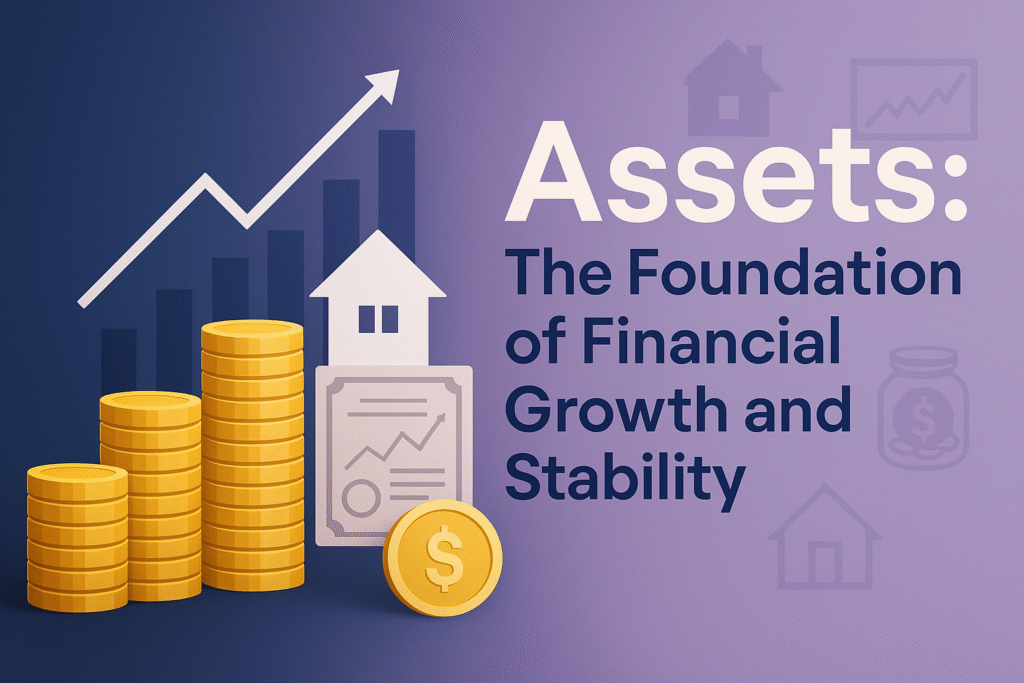Assets are the building blocks of financial stability and wealth creation. In simple terms, an asset is anything you own that has value and can potentially generate income or appreciate over time. Assets come in many forms, including cash, stocks, real estate, businesses, and even intellectual property. Understanding assets and how to manage, grow, and protect them is key to achieving long-term financial security. Corporate Finance Institute (CFI) – What Is an Asset?
Understanding your assets is the first step in building long-term wealth. By learning how to categorize and manage different types of assets, you can make smarter decisions about where to allocate your money and grow your net worth. For a deeper dive into strategies that maximize returns on your investments, visit our Investing Hub to explore comprehensive guides and expert tips.
Key Takeaways
- Assets are resources with economic value that you own or control, expecting future benefits from them
- Different asset types serve different purposes: cash for emergencies, stocks for growth, real estate for income and appreciation
- Building a diversified asset portfolio protects you from risk while maximizing growth potential
- Assets appreciate over time, helping you combat inflation and build long-term wealth
- Starting early with any amount gives your assets more time to compound and grow
What Are Assets? Breaking Down the Basics
At its core, an asset is anything of value that you own or control with the expectation that it will provide future economic benefit. Think of assets as your financial army; each soldier (asset) works to protect and grow your wealth in different ways. Investopedia – Asset Definition
Assets can range from as simple as the cash in your wallet to as complex as shares in a multinational corporation. What makes something an asset isn’t necessarily its price tag, but rather its ability to either:
- Generate income (like rental property or dividend-paying stocks)
- Appreciate over time (like real estate or collectibles)
- Be converted to cash when needed (like savings accounts or bonds)
- Provide utility while maintaining value (like a reliable vehicle for work)
Why Assets Matter
Assets are more than just things you own; they are tools that work for you. By acquiring and growing assets, you can:
- Build financial independence
- Generate passive income streams
- Protect yourself against inflation and economic uncertainty
- Create long-term wealth for yourself and future generations
Categories of Assets
Assets generally fall into two categories:
- Tangible Assets – Physical items such as property, vehicles, or gold.
- Intangible Assets – Non-physical items like stocks, bonds, patents, or digital products.
The Asset vs Liability Distinction
Here’s where many people get tripped up: not everything you buy is an asset. In fact, many purchases are actually liabilities, things that take money out of your pocket rather than putting money in. SBA – Manage Your Assets and Liabilities
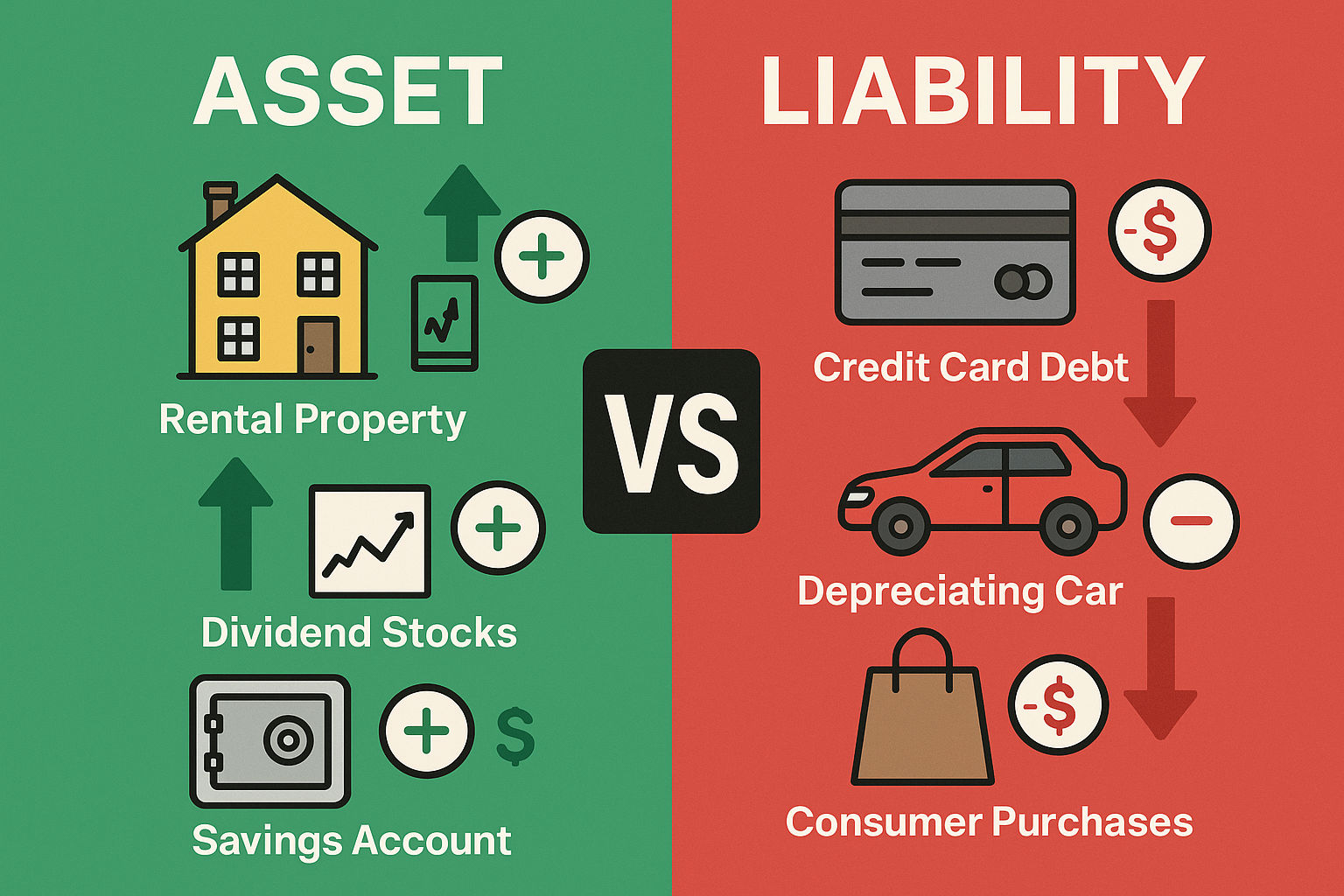
| Item | Asset or Liability? | Why? |
|---|---|---|
| Rental property generating $1,500/month | Asset | The car you drive to work |
| Depreciates, generates no income | Depends | Asset if necessary for income; liability if purely consumption |
| Credit card debt | Liability | Costs you money in interest |
| Emergency fund in savings | Asset | Provides financial security and liquidity |
| Designer handbag | Liability (usually) | Depreciates in value, generates no income |
| Dividend-paying stocks | Depreciates, generates no income | Generates passive income and can appreciate |
The golden rule? Assets put money in your pocket; liabilities take money out of it. Understanding this distinction, Assets vs Liabilities is the first step toward making smarter financial decisions.
Types of Assets: Your Financial Toolkit
Just like a carpenter needs different tools for different jobs, you need various types of assets to build a robust financial foundation. Let’s explore the main categories:
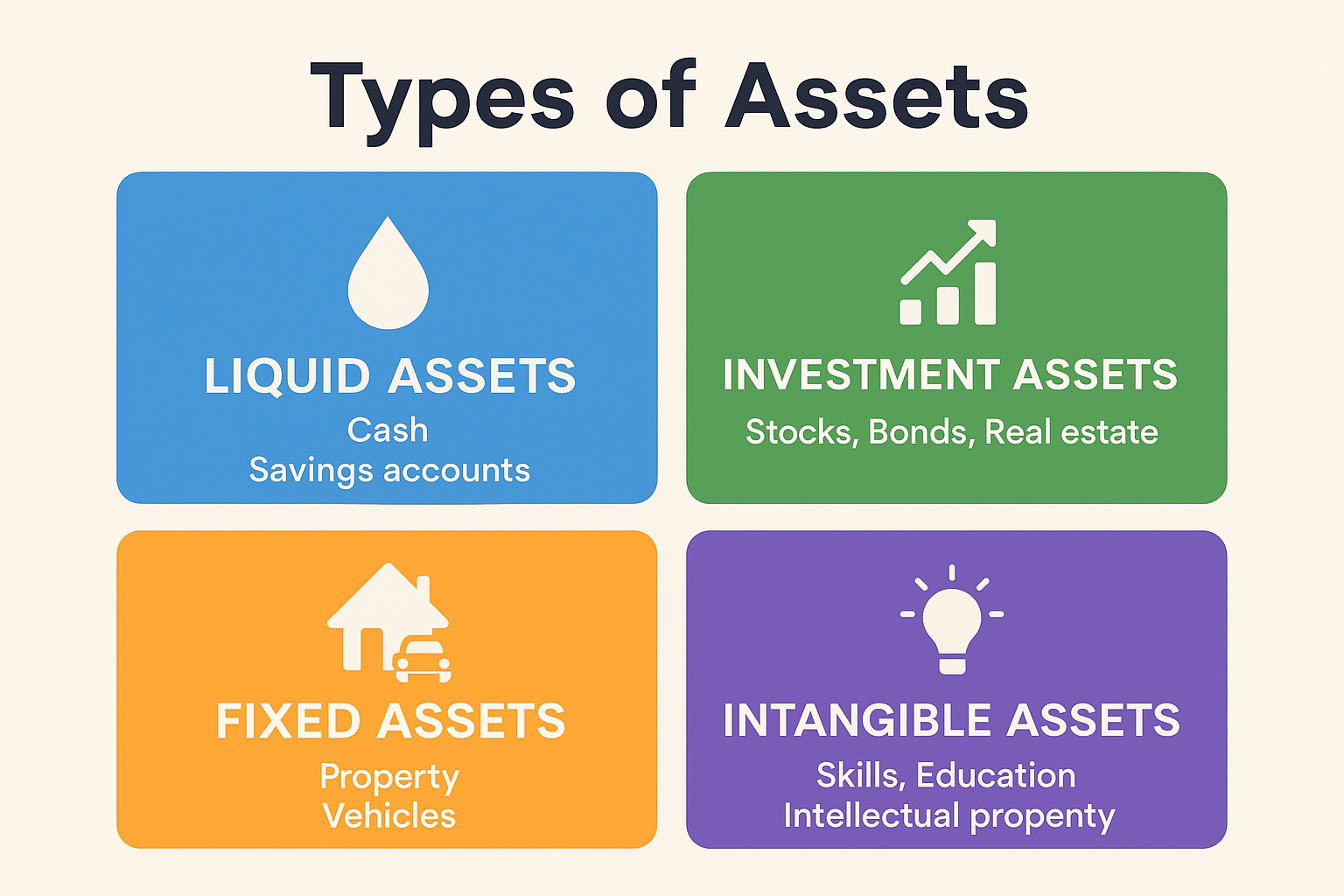
1. Liquid Assets (Your Financial Safety Net)
Liquid assets are those you can quickly convert to cash without losing significant value. These are your first line of defense in emergencies.
Examples include:
- Cash in checking and savings accounts
- Money market accounts
- Certificates of deposit (CDs) with short terms
- Treasury bills
- Cash-value life insurance
Why they matter: When your car breaks down, your furnace dies in winter, or you face unexpected medical bills, liquid assets save the day. Financial experts recommend keeping 3-6 months of living expenses in liquid assets as an emergency fund.
Real-world example: When the COVID-19 pandemic hit in 2020, millions of Americans faced job losses. Those with robust emergency funds (liquid assets) weathered the storm far better than those living paycheck to paycheck.
2. Investment Assets (Your Growth Engine)
These assets are designed to grow your wealth over time through appreciation, income generation, or both. They’re the engines that power long-term financial growth.
Stock market investments represent ownership in companies. When you buy stock, you become a partial owner and benefit when the company succeeds. Understanding why the stock market goes up over time helps you stay committed during volatile periods.
Bonds are essentially loans you make to governments or corporations. In return, you receive regular interest payments plus your principal back at maturity.
Mutual funds and ETFs pool money from many investors to buy diversified portfolios of stocks, bonds, or other securities. They offer instant diversification, crucial for beginners.
Real estate can provide both rental income and property appreciation. Whether it’s a rental property, REIT (Real Estate Investment Trust), or your primary residence, real estate has historically been a wealth-building powerhouse.
Pro Tip: Diversification is your best friend. Don’t put all your eggs in one basket. A mix of stocks, bonds, and real estate typically provides the best risk-adjusted returns over time. Morningstar – Understanding Asset Classes
3. Fixed Assets (Tangible Value)
Fixed assets are physical, long-term assets that you use rather than sell. They’re typically harder to convert to cash quickly but provide ongoing utility.
Examples include:
- Your primary residence
- Vehicles
- Machinery and equipment (for business owners)
- Furniture and fixtures
- Land
Important note: While your home is technically an asset, it’s not generating income unless you rent out part of it. The legendary investor Warren Buffett famously said that a house is “a liability masquerading as an asset” if it’s only costing you money in mortgage, taxes, and maintenance.
4. Intangible Assets (Hidden Value)
These are non-physical assets that still hold significant value:
- Intellectual property (patents, copyrights, trademarks)
- Business goodwill and brand reputation
- Skills and education (your human capital)
- Professional networks and relationships
Your education and skills are perhaps your most valuable assets early in life. They enable you to earn income, which you can then convert into other assets. Investing in yourself through education, certifications, and skill development pays dividends throughout your career.
Why Assets Matter: The Path to Financial Freedom
Understanding and acquiring assets isn’t just about having a bigger number in your bank account—it’s about creating financial security, freedom, and options. Here’s why building assets should be a priority:
1. Assets Generate Passive Income
The dream of making money while you sleep isn’t just a fantasy; it’s the reality of asset ownership. Passive income through dividend investing allows your money to work for you rather than you always working for money.
Consider this scenario: If you own $100,000 worth of high-dividend stocks yielding 4% annually, you’d receive $4,000 per year without selling a single share. That’s $333 per month in passive income, enough to cover a car payment, groceries, or contribute to other goals.
2. Assets Appreciate Over Time
While cash loses purchasing power to inflation (averaging about 3% annually), many assets increase in value faster than inflation. Historically:
- The stock market has returned approximately 10% annually over the long term
- Real estate has appreciated roughly 3-5% annually on average
- Quality collectibles and precious metals have maintained or increased value
This appreciation is how wealth compounds. A $10,000 investment growing at 8% annually becomes $21,589 in 10 years, $46,610 in 20 years, and $100,627 in 30 years, without adding another penny.
3. Assets Provide Financial Security
When you have assets, you have options. Lost your job? Your emergency fund (liquid assets) keeps you afloat while you search. Need to retire? Your investment portfolio generates income to replace your paycheck. Want to start a business? Your accumulated assets can provide startup capital.
Assets are the difference between financial stress and financial peace of mind.
4. Assets Build Generational Wealth
Perhaps the most profound benefit of asset accumulation is the ability to pass wealth to the next generation. Assets like real estate, investment portfolios, and businesses can transfer to your children, giving them a head start you might not have had.
This is how wealthy families stay wealthy: they focus on acquiring and preserving assets across generations, not just earning high incomes.
Properly leveraging your assets can help you invest and save strategically, ultimately building wealth that lasts for generations.”
How to Start Building Your Asset Portfolio Today
Feeling overwhelmed? Don’t be. Building wealth through assets is a marathon, not a sprint. Here’s your roadmap:
Step 1: Establish Your Emergency Fund First
Before investing in anything else, build a liquid asset safety net:
- Start small: Aim for $1,000 initially
- Build to 3-6 months: Calculate your monthly expenses and multiply by 3-6
- Keep it accessible: Use a high-yield savings account
- Don’t touch it: Only for genuine emergencies
This foundation prevents you from having to sell investments at a loss when unexpected expenses arise. Before investing heavily, make sure your emergency savings are in place to cover at least 3–6 months of expenses.
Step 2: Eliminate High-Interest Debt
Credit card debt charging 18-25% interest is a liability that destroys wealth faster than most assets can build it. Before aggressively investing, pay off high-interest debt. The guaranteed “return” of eliminating 20% interest debt beats most investment returns.
Step 3: Start Investing in the Stock Market
You don’t need thousands of dollars to begin. Many platforms now allow you to start with as little as $5. Here’s how:
- Open a retirement account: A 401(k) through your employer or an IRA offers tax advantages
- Start with index funds: These provide instant diversification and low fees
- Automate contributions: Set up automatic transfers so you “pay yourself first.”
- Increase gradually: Bump up contributions with each raise
Understanding why you should invest helps maintain motivation when markets get choppy. Remember, market volatility is normal, learn about the cycle of market emotions to avoid panic selling.
Step 4: Diversify Across Asset Classes
As your portfolio grows, spread your investments across different asset types:
- Stocks: For growth potential
- Bonds: For stability and income
- Real Estate: For inflation protection and passive income
- Alternative assets: Consider commodities, precious metals, or other options as you advance
The right mix depends on your age, risk tolerance, and goals. Younger investors can typically handle more stock exposure, while those nearing retirement should shift toward more conservative assets.
Step 5: Continuously Educate Yourself
The financial landscape constantly evolves. Stay informed by:
- Reading reputable financial websites and books
- Following market trends and economic indicators
- Learning from smart financial moves others have made
- Understanding why people lose money in the stock market to avoid common pitfalls
Knowledge is itself an asset—one that compounds over time just like your investments.
Common Mistakes to Avoid When Building Assets
Even with the best intentions, many beginners stumble. Here are pitfalls to avoid:
1: Confusing Income with Wealth
A high salary doesn’t automatically create wealth. Plenty of six-figure earners live paycheck to paycheck because they don’t convert income into assets. Focus on your savings rate (percentage of income saved) rather than just income level.
2: Trying to Time the Market
Countless studies show that time IN the market beats timing THE market. Waiting for the “perfect” time to invest often means missing out on years of growth. Start now with what you have.
3: Putting All Eggs in One Basket
Concentration might build wealth, but diversification preserves it. Don’t bet everything on a single stock, property, or asset class. Spread your risk.
4: Ignoring Inflation
Keeping all your money in a checking account earning 0.01% interest means you’re actually losing purchasing power every year. Your assets should outpace inflation to grow real wealth.
5: Emotional Decision-Making
Fear and greed drive poor financial decisions. When markets crash, fear causes panic selling at the worst time. When markets soar, greed drives buying at peaks. Stick to your plan and avoid emotional reactions.
Advanced Asset-Building Strategies
Once you’ve mastered the basics, consider these advanced approaches:
Tax-Advantaged Accounts
Maximize contributions to:
- 401(k) plans: Especially if your employer offers matching (free money!)
- Traditional or Roth IRAs: Choose based on your current vs. future tax situation
- HSAs (Health Savings Accounts): Triple tax advantage for medical expenses
- 529 plans: For education savings
These accounts supercharge your asset growth by reducing your tax burden.
Real Estate Investment
Beyond your primary residence, consider:
- Rental properties: Generate monthly cash flow
- REITs: Invest in real estate without being a landlord
- House hacking: Rent out rooms in your home to offset mortgage costs
- Real estate crowdfunding: Pool money with others for larger projects
Real estate provides diversification from stock market volatility and potential tax benefits.
Business Ownership
Starting or buying a business can be one of the most powerful wealth-building assets. Businesses can generate income, appreciate, and eventually be sold for a significant profit.
Even side hustles count—that freelance work or online store is an asset if it generates income beyond your time investment.
Alternative Investments
As wealth grows, some investors explore:
- Precious metals (gold, silver) as inflation hedges
- Collectibles (art, wine, classic cars) for diversification
- Cryptocurrency (high risk, potential high reward)
- Peer-to-peer lending for income generation
These carry additional risks and require more expertise, so educate yourself thoroughly before diving in.
Measuring Your Asset Growth: Key Metrics to Track
You can’t improve what you don’t measure. Track these metrics quarterly or annually:
Net Worth
Net Worth = Total Assets – Total Liabilities
This is your ultimate financial scorecard. Aim to increase it consistently year over year. Apps like Mint, Personal Capital, or simple spreadsheets can track this automatically.
Asset Allocation
What percentage of your assets is in:
- Cash and equivalents
- Stocks
- Bonds
- Real estate
- Other
Your allocation should align with your goals and risk tolerance, typically becoming more conservative as you age.
Return on Investment (ROI)
Track how your investments perform:
ROI = (Current Value – Original Investment) ÷ Original Investment × 100
Compare your returns to relevant benchmarks (like the S&P 500 for stocks) to ensure you’re on track.
Savings Rate
Savings Rate = Amount Saved ÷ Gross Income × 100
Many financial independence seekers aim for 20-50% savings rates. The higher your savings rate, the faster you build assets and the sooner you can achieve financial independence.
Real-Life Asset-Building Success Stories
The Teacher Who Retired a Millionaire
Ronald Read, a janitor and gas station attendant, died in 2014 at age 92 with an $8 million estate. His secret? He lived frugally, bought quality dividend-paying stocks, and held them for decades. He understood that consistent asset accumulation, no matter how modest the starting point, compounds into wealth over time.
The Couple Who Achieved Financial Independence at 30
Kristy and Bryce, known as the “Millennial Revolution,” retired in their early 30s with a $1 million portfolio. They saved aggressively (70% of their income), invested in low-cost index funds, and lived in affordable locations. Their story proves that strategic asset-building can dramatically accelerate financial freedom.
These stories share common themes: living below your means, consistently saving, investing in appreciating assets, and staying patient through market ups and downs.
The Psychology of Asset Building: Mindset Matters
Building wealth isn’t just about numbers; it’s about developing the right mindset:
Delayed Gratification
The ability to forgo immediate pleasure for future benefit is perhaps the strongest predictor of financial success. That new gadget might bring joy today, but investing that money creates options tomorrow.
Rather than chasing quick wins, understanding delayed gratification can help you grow wealth steadily
Long-Term Thinking
Wealth building is a marathon. The stock market’s long-term upward trajectory rewards patience, but you must endure short-term volatility without panic.
Abundance vs Scarcity Mindset
An abundance mindset sees opportunities to create value and grow wealth. A scarcity mindset focuses on what’s lacking. Choose abundance; there are always ways to earn more, save more, and invest smarter.
Continuous Improvement
Commit to learning and improving your financial literacy. Read books, follow reputable financial experts, and stay curious. Every bit of knowledge helps you make better asset-building decisions.
Assets and Life Stages: Adapting Your Strategy
Your asset-building approach should evolve as you age:
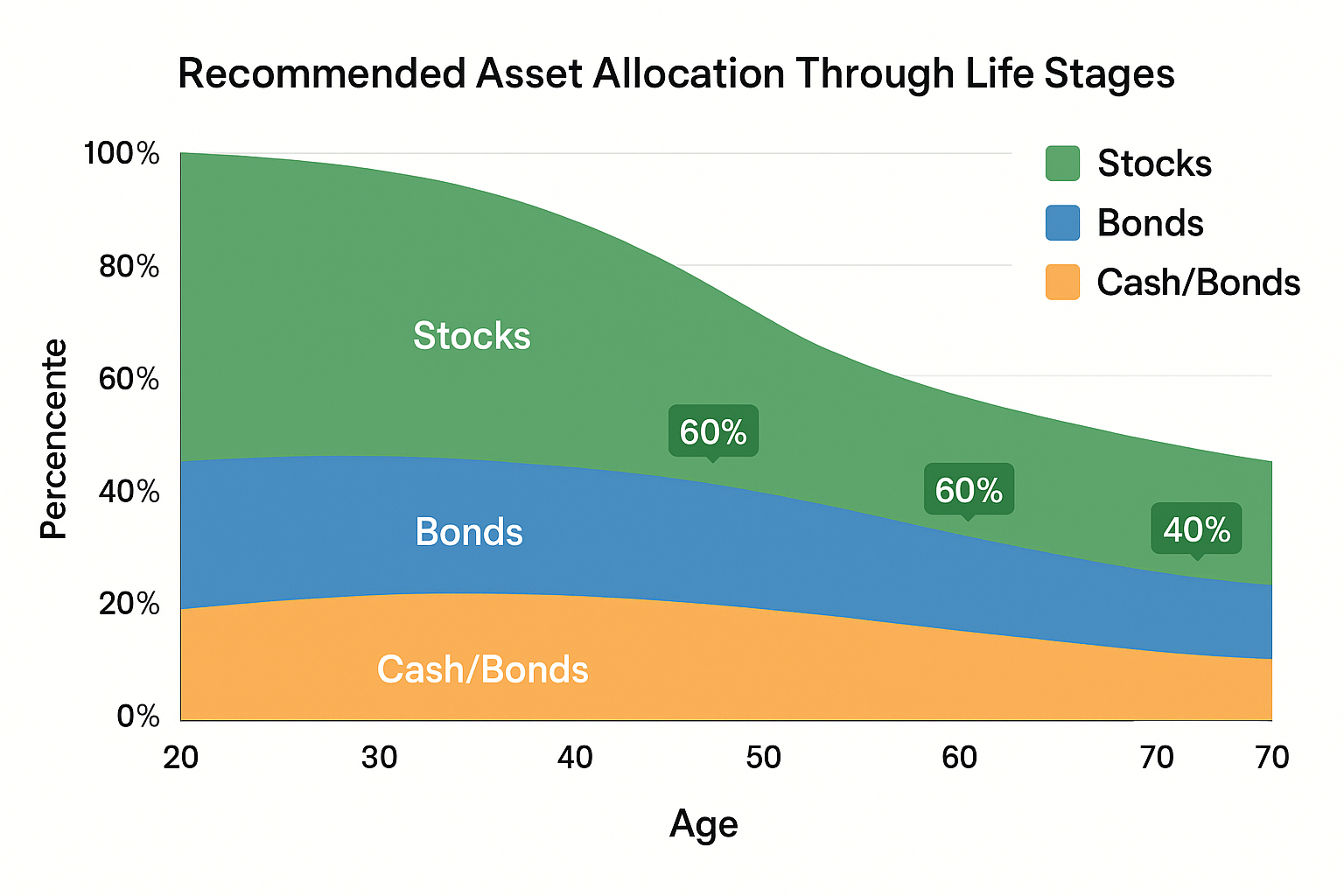
In Your 20s: Build the Foundation
- Focus: Emergency fund, eliminate debt, start retirement contributions
- Asset allocation: Aggressive (80-90% stocks)
- Priority: Maximize earning potential through career development
In Your 30s: Accelerate Growth
- Focus: Increase savings rate, diversify investments, possibly buy a home
- Asset allocation: Growth-oriented (70-80% stocks)
- Priority: Balance lifestyle improvements with aggressive saving
In Your 40s: Peak Earning Years
- Focus: Maximize retirement contributions, consider real estate, fund education accounts
- Asset allocation: Balanced growth (60-70% stocks)
- Priority: Catch up on retirement if behind, protect assets with insurance
In Your 50s: Preservation Mode
- Focus: Maximize catch-up contributions, reduce debt, plan for retirement
- Asset allocation: Moderate (50-60% stocks)
- Priority: Ensure retirement assets will sustain the desired lifestyle
In Your 60s+: Distribution Phase
- Focus: Convert assets to income, minimize taxes, and estate planning
- Asset allocation: Conservative (30-40% stocks)
- Priority: Preserve wealth while generating sustainable income
The Future of Assets: Emerging Trends
The asset landscape continues evolving. Stay aware of:
Digital Assets
Cryptocurrency and blockchain technology represent new asset classes. While volatile and speculative, they’re becoming more mainstream. Approach with caution and never invest more than you can afford to lose.
Fractional Ownership
Technology now allows fractional ownership of previously inaccessible assets—from commercial real estate to fine art. This democratizes investing but requires careful vetting of platforms.
ESG Investing
Environmental, Social, and Governance (ESG) investing allows you to align your assets with your values while still seeking returns. This trend is rapidly growing, especially among younger investors.
Automation and Robo-Advisors
Algorithm-driven investment platforms make professional portfolio management accessible at low costs. These can be excellent tools for beginners, though understanding the basics yourself remains crucial.
🎯 Asset Allocation Calculator
Discover your ideal asset mix based on your age and risk tolerance
Your Recommended Allocation
Building Assets: Your Action Plan for the Next 30 Days
Knowledge without action is useless. Here’s what to do in the next month:
Week 1: Assessment
- Calculate your current net worth
- List all your assets and liabilities
- Determine your savings rate
- Set specific financial goals (short, medium, and long-term)
Week 2: Foundation Building
- Open a high-yield savings account if you don’t have one
- Set up automatic transfers to savings
- Research low-cost index funds
- Review your employer’s 401(k) match (don’t leave free money on the table!)
Week 3: Start Investing
- Open an IRA or increase 401(k) contributions
- Make your first investment in a diversified index fund
- Set up automatic monthly investments
- Subscribe to one quality financial education resource
Week 4: Optimize and Plan
- Review all subscriptions and expenses—redirect savings to assets
- Create a written financial plan
- Schedule quarterly portfolio reviews
- Share your goals with an accountability partner
Protecting Your Assets: Risk Management Essentials
Building assets is only half the battle; protecting them is equally crucial:
Insurance as Asset Protection
Adequate insurance prevents catastrophic losses that could wipe out years of asset accumulation:
- Health insurance: Medical bankruptcy destroys more wealth than any market crash
- Life insurance: Protects your family’s financial future if you die prematurely
- Disability insurance: Protects your income-generating ability
- Homeowners/renters insurance: Protects your physical assets
- Umbrella policy: Additional liability coverage for high-net-worth individuals
Estate Planning
Ensure your assets transfer according to your wishes:
- Will: Specifies how assets are distributed
- Trust: Can minimize taxes and probate costs
- Beneficiary designations: Keep these updated on all accounts
- Power of attorney: Allows someone to manage assets if you’re incapacitated
Diversification as Protection
Don’t put all your eggs in one basket. Spread assets across:
- Different asset classes (stocks, bonds, real estate)
- Geographic regions (domestic and international)
- Industries and sectors
- Individual securities (don’t over-concentrate in any single stock)
The Tax Implications of Asset Ownership
Different assets face different tax treatments; understanding this can significantly boost your after-tax returns:
Tax-Advantaged Growth
- 401(k) and Traditional IRA: Tax-deductible contributions, tax-deferred growth, taxed at withdrawal
- Roth IRA: After-tax contributions, tax-free growth, and withdrawals
- HSA: Triple tax advantage, deductible, tax-free growth, tax-free medical withdrawals
Capital Gains Treatment
- Short-term gains (assets held <1 year): Taxed as ordinary income
- Long-term gains (assets held >1 year): Preferential tax rates (0%, 15%, or 20% depending on income)
- Strategy: Hold appreciating assets for at least one year when possible
Tax-Loss Harvesting
Strategically sell losing investments to offset gains and reduce tax liability. This advanced strategy can save thousands annually for high-net-worth investors.
Real Estate Tax Benefits
- Mortgage interest deduction: Reduces taxable income
- Depreciation: Shields rental income from taxes
- 1031 exchanges: Defer capital gains when swapping properties
- Primary residence exclusion: Up to $250,000 ($500,000 married) in gains tax-free
Working with a qualified tax professional ensures you legally and ethically maximize these benefits.
Assets in Different Economic Environments
Asset performance varies based on economic conditions. Understanding this helps you prepare:
During Inflation
Winners:
- Real estate (rents and values increase)
- Commodities (gold, oil, agricultural products)
- I-Bonds and TIPS (inflation-protected securities)
- Stocks of companies with pricing power
Losers:
- Cash (purchasing power erodes)
- Fixed-rate bonds (locked into lower rates)
- Fixed-income investments
Strategy: Maintain exposure to inflation-hedging assets, especially during high-inflation periods.
During Recessions
Winners:
- High-quality bonds (flight to safety)
- Dividend aristocrats (stable companies with consistent dividends)
- Cash (buying power during market lows)
- Consumer staples stocks
Losers:
- Cyclical stocks (travel, luxury goods, construction)
- Speculative investments
- Highly leveraged real estate
Strategy: Maintain adequate cash reserves and don’t panic-sell quality assets at depressed prices. Recessions create buying opportunities for patient investors.
During Economic Expansion
Winners:
- Growth stocks (technology, consumer discretionary)
- Small-cap stocks (higher growth potential)
- Real estate (increasing demand)
- Cyclical sectors
Losers:
- Bonds (rising interest rates reduce bond values)
- Defensive stocks (utilities, consumer staples underperform)
Strategy: Tilt toward growth assets but maintain diversification. Don’t abandon defensive positions entirely.
Conclusion: Your Journey to Asset-Based Wealth Starts Now
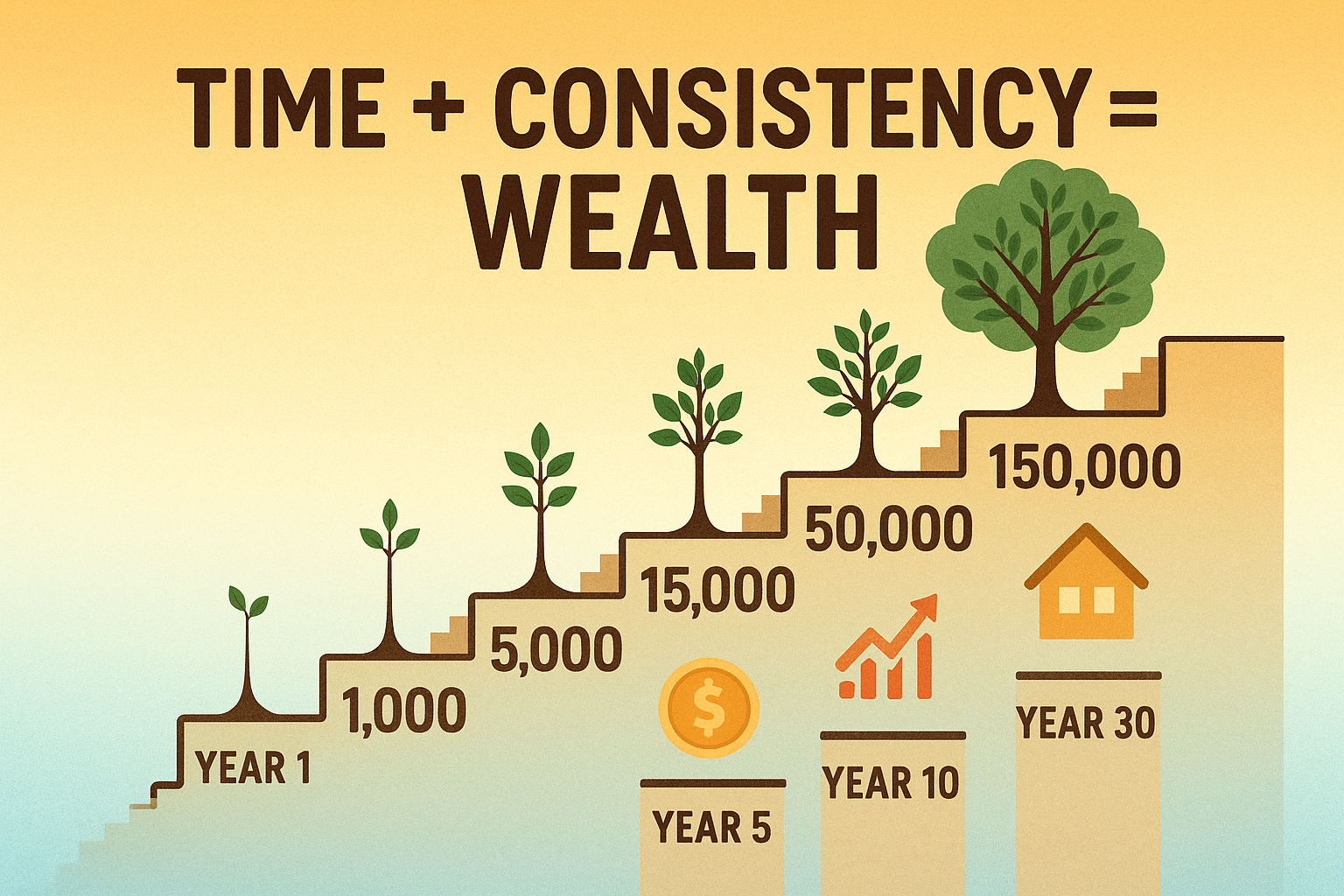
Building wealth through assets isn’t a get-rich-quick scheme; it’s a get-rich-for-certain plan that requires time, discipline, and education. The good news? You don’t need to be wealthy to start; you start to become wealthy.
Additionally, if you’re looking to compare asset classes and understand how they fit into a balanced portfolio, the Investing Guide offers detailed insights that can help you make informed choices.
The principles are simple:
Understand what assets are and how they work
Distinguish between assets and liabilities
Start with emergency savings and debt elimination
Invest consistently in diversified assets
Protect your assets with insurance and smart planning
Educate yourself continuously
Stay patient through market cycles
The best time to start building assets was ten years ago. The second-best time is today. Take action on at least one item from the 30-day action plan above. Open that savings account. Make that first investment. Calculate your net worth. Whatever you do, do something.
Your future self will thank you for the assets you start building today. The path to financial freedom isn’t mysterious; it’s paved with assets that work for you while you sleep, grow over time, and provide security for you and your loved ones.
What asset will you acquire first? The choice is yours, but the time to start is now.
Disclaimer
This article is for educational and informational purposes only and should not be construed as financial, investment, tax, or legal advice. Asset values can fluctuate, and past performance does not guarantee future results. Before making any investment decisions, consult with a qualified financial advisor who understands your individual circumstances, goals, and risk tolerance. The author and publisher are not responsible for any financial decisions made based on the information in this article.
About the Author
Max Fonji is a financial educator and content strategist specializing in making complex financial concepts accessible to everyday investors. With over a decade of experience in personal finance education, Max has helped thousands of individuals take control of their financial futures through practical, actionable advice. When not writing about money, Max enjoys analyzing market trends, reading behavioral economics research, and mentoring young professionals on their wealth-building journeys. Connect with Max and discover more financial wisdom at TheRichGuyMath.com.
Assets are anything of value that a person or business owns and can use to generate income or benefits. Examples include cash, real estate, stocks, vehicles, and equipment. In finance, assets are resources that increase your net worth.
The three primary types of assets are:
Current assets — cash or items easily converted into cash within a year (e.g., checking account balance, inventory).
Fixed assets — long-term items like property, plant, and equipment used for business operations.
Intangible assets — non-physical items such as patents, trademarks, or goodwill.
Personal assets: Belong to an individual (e.g., savings, home, car).
Business assets: Owned by a company and used to produce revenue (e.g., machinery, office equipment, intellectual property).
Your net worth = total assets – total liabilities.
If your assets grow (like your investments or property value), your net worth increases. If liabilities rise faster than assets, your net worth decreases.
Assets that often increase in value over time include:
Real estate
Stocks and ETFs
Collectibles (art, rare coins)
Precious metals (gold, silver)
Certain businesses and intellectual property
Asset: Something that puts money in your pocket (e.g., rental property income).
Liability: Something that takes money out of your pocket (e.g., mortgage or credit card debt).
In short: assets add, liabilities subtract.
Liquid assets can be quickly turned into cash (cash, savings accounts, stocks).
Non-liquid assets are harder to sell quickly without losing value (such as real estate, collectibles, and business equity).
